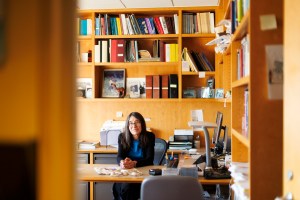World’s largest oil firm chief touts research to make fossil fuels ‘cleaner’
The head of the world’s largest oil company said that renewable sources can’t meet the world’s growing energy needs so research dollars should be aimed at both developing renewable sources and at making fossil fuels cleaner.
Abdallah S. Jum’ah, president and chief executive officer of the Saudi Arabian Oil Co., also known as Saudi Aramco, said that expected growth in the industrialized world coupled with a growing global population and industrialization of the developing world will significantly increase global energy needs over the next 25 years.
Though renewable energy sources are expected to meet more of the world’s energy needs than they do today, the increase is expected to be minor, just about 1 percent of the global energy supply. That means the bulk of the world’s energy needs, roughly 85 percent, will continue to be met by fossil fuels: oil, coal, and natural gas, Jum’ah said.
“The immediate future looks a lot like the present and the past,” Jum’ah said.
Jum’ah spoke to a packed audience at Harvard’s Science Center on Jan. 31. He spoke as part of the Harvard Center for the Environment’s ongoing lecture series on The Future of Energy.
Jum’ah, who attended Harvard Business School’s program for management development, began his career at the Saudi Arabian government-owned company in 1968. He sits on the company’s board of directors and on the Saudi Arabian Supreme Council of Petroleum and Mineral Affairs. In 2005, Fortune Magazine listed him as third on its list of Asia’s most powerful business leaders.
Center for the Environment Director Daniel Schrag said Jum’ah’s talk was particularly appropriate because his company produces 10 percent of the world’s oil and controls 25 percent of the world’s proven reserves.
“Saudi Aramco, over the next century, will play a critical role in the production of hydrocarbons,” Schrag said.
Today, Jum’ah said, oil provides about 40 percent of the world’s energy: just a fraction of electricity generation, but 97 percent of the energy in the transportation sector.
With the global population expected to expand by between 1.5 billion and 4 billion people, more people are going to need access to energy in the coming years, he said. In addition, as the developing world narrows the gap in living standards with the developed world, energy usage will soar. More than 2 billion people today live in what Jum’ah called “energy poverty” without access to any energy services.
As the gap is closed, more people will likely be driving cars. Today, there are roughly 800 cars per 1,000 people in America, but just 10 to 20 cars per 1,000 people in China and India. With the potential for growth in the auto market alone, Jum’ah said, one can easily see the drivers of the growth in global oil demand.
The world’s energy future, Jum’ah said, will not be a case of “either-or” regarding fossil fuels or renewable energy; it will demand more of both. Despite his position as an oil company executive, Jum’ah said he welcomes advances in renewable energy production, because they’ll be needed to meet the world’s thirst for energy.
While oil demand is expected to rise from 85 million barrels a day to 120 million barrels a day by 2030, Jum’ah said global oil reserves are plentiful. Between proven reserves and expected new fields, there should be enough oil to provide 140 years’ supply at today’s consumption rates.
Jum’ah said that proven conventional oil reserves total 1.2 trillion barrels and proven unconventional reserves 1.5 trillion barrels. He estimated another 2 trillion barrels are available to be discovered.
“There’s enough oil to meet the world’s needs for many decades to come,” Jum’ah said.
The bad news, he said, is that the continued reliance on fossil fuels carries a heavy environmental burden. With global warming a growing environmental problem, research should not just be directed at improving renewable energy generation, but should also be focused on ways to mitigate the impact of continued reliance on fossil fuels, such as finding ways to clean up emissions, develop vehicles with dramatically better gas mileage, and consume energy more efficiently in other areas.
Given the environmental impact of fossil fuels as they’re used today, that means decisions about energy use need to be made with the environment in mind. Energy and the environment have to be part of the same discussion, he said.
“Decisions about energy, economic expansion, and the environment must go hand in hand. That is both our challenge and our opportunity,” Jum’ah said.
Saudi Aramco is not investing in developing renewable energy sources, Jum’ah said, but is working to make its own operations more energy efficient.
Jum’ah, who spoke for about 45 minutes, said the United States and Saudi Arabia are in this together. The two nations are interdependent, he said, with government-owned Aramco dependent on the United States for its market, and the United States dependent on Aramco for its oil. Further, Jum’ah said, the United States’ global influence makes its economic health not just a factor in the U.S. market, but a major factor in the health of the global market, affecting Saudi Aramco’s other international clients.
“What happens here and what’s decided here matters everywhere,” Jum’ah said.





